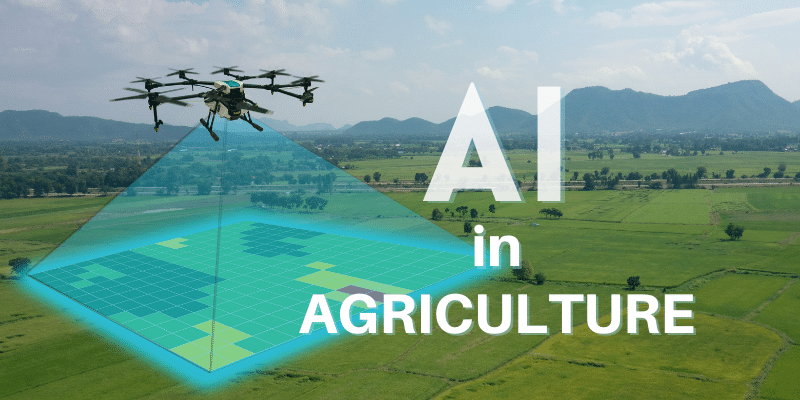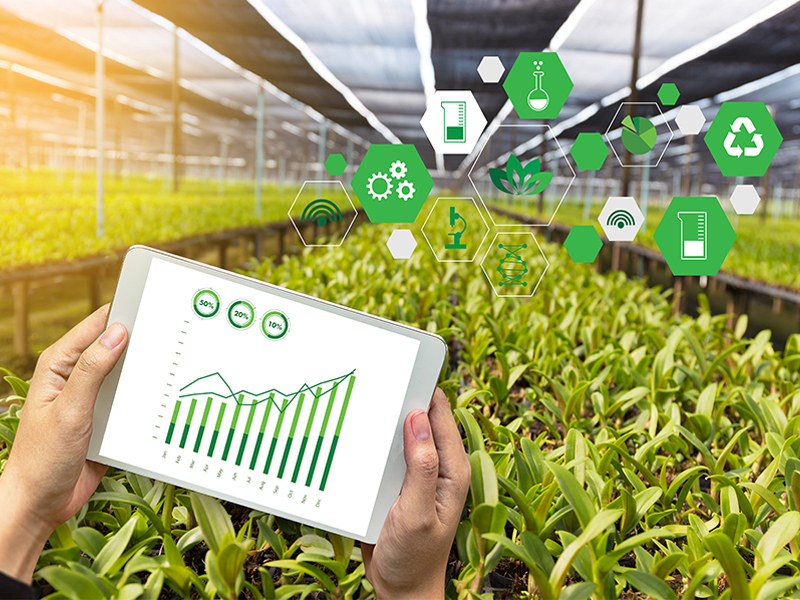Artificial Intelligence (AI) and machine learning (ML) have emerged as effective tools in revolutionizing agriculture by increasing crop output, optimising resource management, and promoting sustainable farming practises. These are just some of the ways that AI and ML are transforming the agricultural industry.
The scope of an Artificial intelligence course can vary depending on its level (undergraduate, graduate, or specialized programs), duration, and curriculum. As AI continues to advance, there will be increasing demand for professionals with AI skills in various industries, making the scope of AI courses promising and dynamic.
The following are some important applications of artificial intelligence and machine learning in agriculture:
In precision farming, artificial intelligence and machine learning algorithms analyse a wide variety of data sources to provide real-time insights and suggestions. These data sources include satellite imaging, weather patterns, soil composition, and previous crop data.
How is AI and ML revolutionizing agriculture?
Farmers can make data-driven decisions on irrigation, fertilization, and pest management, optimizing resource allocation and minimizing waste. This precision farming approach enables targeted interventions, leading to improved crop yields and reduced environmental impact.
Monitoring Crop Health and Identifying Diseases:
AI and ML models can analyse photos acquired by drones, satellites, or ground-based sensors to monitor the health of crops and identify any diseases or nutrient shortages that may be present. These algorithms are able to recognise certain plant illnesses, pests, or stress indicators by utilising computer vision techniques, which enables early intervention and prevents the spread of diseases.
This preventative monitoring provides farmers with the information they need to execute targeted treatments, cut down on their use of chemicals, and guarantee the best possible crop health. Accelerate Your Path to Success: Enroll in Our Premier Web Developer Bootcamp.
Yield Prediction and Agricultural Optimization:
AI and ML algorithms process historical data to predict agricultural yields. This data may include weather patterns, soil conditions, and crop traits. Crops may also be optimised based on this data. These models take into account a number of different aspects in order to produce reliable yield projections.
With this information, farmers are able to optimise planting schedules, estimate harvest quantities, and make educated decisions regarding the storage, transportation, and selling of their crops. The entirety of the agricultural value chain benefits from this improvement in efficiency and planning.
Irrigation Management:
In order to achieve optimal irrigation practices, AI and ML algorithms analyse data gathered from soil sensors, as well as the latest weather forecasts and crop water requirements. These systems provide real-time advice on when and how much water should be applied.
They do this by continuously monitoring the soil moisture levels and the weather conditions. This helps to ensure optimal water consumption and reduces the amount of water that is wasted. This method of precision irrigation helps to preserve resources while also promoting environmentally responsible water management.
Accelerating Crop Breeding and Genetic Development:
Artificial intelligence and machine learning approaches help speed up crop breeding and genetic development. These algorithms find genetic markers linked with desirable qualities by analysing enormous volumes of genomic data. This makes the selection of superior plant types much easier.
Breeders now have the ability to design crops with enhanced yields, disease resistance, and tolerance to environmental stressors. This contributes to the development of agriculture systems that are more robust and productive.
Optimization of Supply networks:
Artificial intelligence and machine learning have the potential to improve agricultural supply networks by doing data analyses on logistics, inventory, and demand patterns. These algorithms optimise transportation routes, cut down on food waste, and increase the efficiency of supply chain operations. As a result, crops are transported and distributed in a timely way while simultaneously reducing their impact on the environment and their consumption of resources.
Farm Robotics and Automation:
Artificial intelligence (AI) and machine learning (ML) technologies are used in the various farm robotics and automation systems. Robots equipped with AI algorithms can perform tasks such as harvesting, weeding, and sorting, reducing the labor-intensive nature of agricultural operations. In the agricultural sector, these technologies help alleviate labour shortages while also increasing production and lowering costs.
Pest and Disease Management:
AI and ML algorithms aid in pest and disease management by monitoring and predicting outbreaks. These algorithms are able to provide early warnings and make recommendations for relevant remedies since they analyse data on insect populations, weather conditions, and crop vulnerabilities. This preventative method assists farmers in minimizing crop losses, reducing their dependence on pesticides, and promoting practices that are more environmentally friendly in the management of pests.
Weed Detection and the Application of Herbicides:
With Greater Precision, Artificial intelligence and machine learning models are able to recognise and categorise various weed species present in fields by utilising image recognition techniques. This permits tailored herbicide application, which reduces the amount of chemical used and lessens the impact on plants that are not the intended target. Farmers can maximise crop growth, improve resource efficiency, and promote sustainable weed control practices if they accurately detect and manage weeds. This is achieved through promoting sustainable weed management practices.
Management of Livestock:
Artificial intelligence and machine learning technologies are used in livestock management, which improves animal health, welfare, and productivity. Machine learning algorithms analyze data from sensors, such as wearable devices, to monitor vital signs, detect health issues, and predict animal behavior. The ability to intervene early, optimise feeding techniques, and improve overall management practices in livestock farming are all made possible as a result of this.
Analytics Predictive of Market Trends:
Artificial intelligence and machine learning algorithms analyse market data, historical prices, and consumer trends in order to produce predictive analytics for farmers. Farmers are able to select crops, determine production numbers, and time their market entries more intelligently when they have access to these insights and utilise them. This assists in optimising profitability, reducing financial risks, and better aligning agricultural production with the demands of the market.
Monitoring and Managing Soil Health:
Artificial intelligence and machine learning models provide assistance in monitoring soil health by doing data analysis on readings from soil sensors, satellite imaging, and historical records. These algorithms analyse the fertility of the soil, as well as its moisture levels and nutrient content, and then make recommendations for best practices in soil management.
By optimizing soil health, farmers can improve crop productivity, reduce nutrient runoff, and promote sustainable soil management practices. Increasing Climate Resilience and Adaptation Artificial intelligence (AI) and machine learning (ML) technologies are helping farmers adapt to the effects of climate change and increase climate resilience.
These algorithms provide useful insights on optimal crop varieties, planting dates, and adaptation tactics by analysing climatic data, historical patterns, and crop responses. This enables farmers to make decisions based on accurate information, which allows them to reduce the risks posed by climate change and maintain productivity despite shifting climatic conditions.
Farm Management Systems:
AI and ML are both being included into farm management systems, which are designed to centralize and analyse data gathered from a variety of sources, including sensors, machines, and weather stations. These systems offer real-time monitoring, analytics, and decision assistance to farmers. As a result, resource allocation, task scheduling, and the optimisation of agricultural operations may be accomplished more effectively.
Sustainable Resource Management:
AI and ML contribute to sustainable resource management by optimizing the use of water, fertilizers, and energy in agriculture. These technologies make precise resource allocation and the reduction of waste possible through the analysis of data on the availability of resources, the requirements of crops, and the elements in the environment. This encourages the conservation of resources, lessens the impact on the environment, and contributes to farming practises that are more sustainable.
Summary:
Traditional agricultural practices are being revolutionised by the application of artificial intelligence and machine learning in agriculture, which enables more effective utilisation of resources, enhanced decision-making, and farming practices that are more environmentally friendly. Agriculture has the potential to become more environmentally friendly, productive, and efficient if it makes use of the power of AI and ML.
These technologies, which provide insights that are driven by data, give farmers the ability to make educated decisions, maximise the use of resources, and adopt practices that are more precision-oriented. In the end, the application of AI and ML in agriculture leads to increased crop yields, decreased negative effects on the environment, and the development of food systems that are both sustainable and resilient.
These technologies have the potential to address urgent difficulties in food production, environmental sustainability, and climate resilience, ultimately leading to a global food supply that is more secure and more environmentally sustainable.
⚠ Article Disclaimer
The above article is sponsored content any opinions expressed in this article are those of the author and not necessarily reflect the views of CTN News







